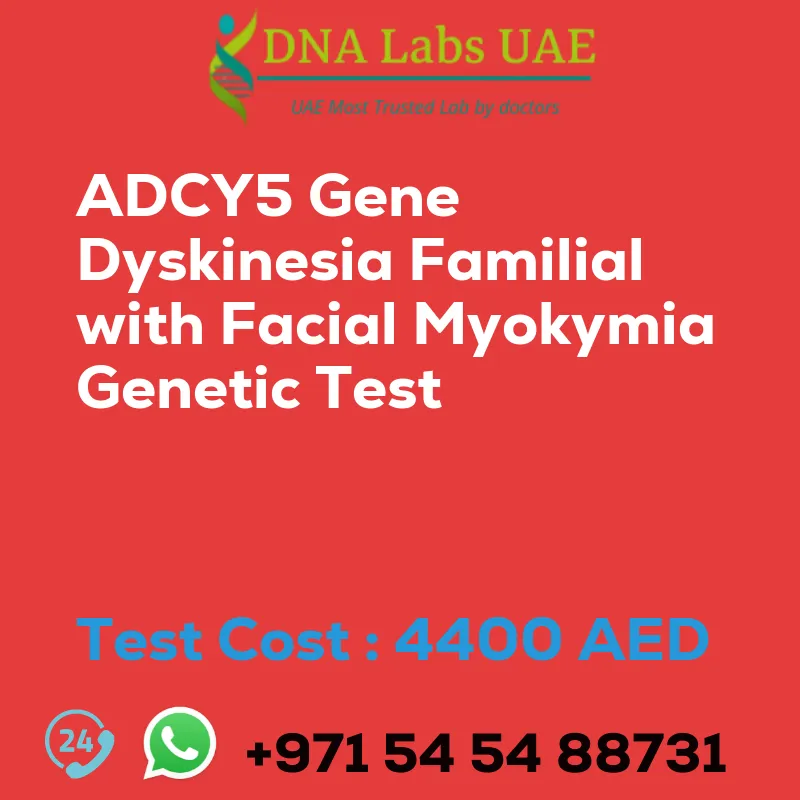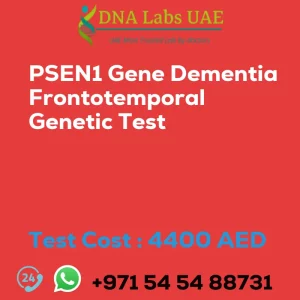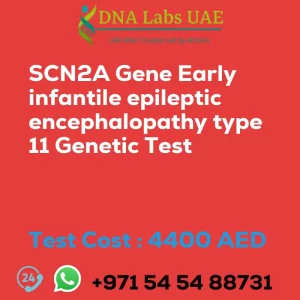ADCY5 Gene Dyskinesia familial with facial myokymia Genetic Test
At DNA Labs UAE, we offer the ADCY5 Gene Dyskinesia familial with facial myokymia Genetic Test. This test is designed to diagnose a rare genetic disorder known as familial dyskinesia with facial myokymia (FDFM). FDFM is characterized by involuntary movements of the face, limbs, and trunk, as well as muscle stiffness and weakness.
Test Details
The ADCY5 gene is associated with FDFM. To analyze this gene, we use next-generation sequencing (NGS) technology, which allows us to examine multiple genes simultaneously. This comprehensive approach helps us identify any mutations or variations in the ADCY5 gene that may be linked to FDFM.
Test Components and Price
The ADCY5 Gene Dyskinesia familial with facial myokymia Genetic Test costs AED 4400.0. The test requires a blood sample, and the results are typically delivered within 3 to 4 weeks.
Test Type and Department
The ADCY5 Gene Dyskinesia familial with facial myokymia Genetic Test falls under the category of Neurological Disorders. Our experienced neurologists oversee the testing process, ensuring accurate and reliable results. The test is conducted in our Genetics department.
Pre Test Information
Prior to undergoing the ADCY5 Gene Dyskinesia familial with facial myokymia Genetic Test, it is important to provide the clinical history of the patient. Additionally, a genetic counseling session is recommended to draw a pedigree chart of family members affected by FDFM. This information aids in the interpretation of test results and allows for informed decision-making.
Benefits of Testing
NGS genetic testing for FDFM not only helps diagnose the disorder but also provides valuable information about the specific genetic mutation responsible for the condition. This information can be crucial in predicting the disease’s progression, developing an effective treatment plan, and identifying family members who may be at risk of inheriting the disorder.
Choosing a Qualified Healthcare Provider
It is essential to have the ADCY5 Gene Dyskinesia familial with facial myokymia Genetic Test performed by a qualified healthcare provider with expertise in genetic testing and counseling. Our neurologists specialize in this field and can guide patients through the testing process, explain the risks and benefits, and assist in result interpretation.
Don’t wait any longer. Contact DNA Labs UAE today to schedule your ADCY5 Gene Dyskinesia familial with facial myokymia Genetic Test and take control of your healthcare.
| Test Name | ADCY5 Gene Dyskinesia familial with facial myokymia Genetic Test |
|---|---|
| Components | |
| Price | 4400.0 AED |
| Sample Condition | Blood |
| Report Delivery | 3 to 4 Weeks |
| Method | NGS Technology |
| Test type | Neurological Disorders |
| Doctor | Neurologist |
| Test Department: | Genetics |
| Pre Test Information | Clinical History of Patient who is going for ADCY5 Gene Dyskinesia, familial, with facial myokymia NGS Genetic DNA Test A Genetic Counselling session to draw a pedigree chart of family members affected with ADCY5 Gene Dyskinesia, familial, with facial myokymia |
| Test Details |
The ADCY5 gene is associated with a rare genetic disorder called familial dyskinesia with facial myokymia (FDFM). This disorder is characterized by involuntary movements of the face, limbs, and trunk, as well as muscle stiffness and weakness. NGS genetic testing is a type of genetic testing that uses next-generation sequencing technology to analyze multiple genes at once. This type of testing can be used to identify mutations or variations in the ADCY5 gene that may be associated with FDFM. NGS genetic testing for FDFM can help diagnose the disorder, as well as provide information about the specific genetic mutation that is causing the condition. This information can be useful for predicting the course of the disease, developing a treatment plan, and identifying family members who may be at risk of inheriting the disorder. It is important to note that genetic testing for FDFM should be performed by a qualified healthcare provider with experience in genetic testing and counseling. They can help patients understand the risks and benefits of testing, as well as provide guidance on how to interpret the results and make informed decisions about their healthcare. |








